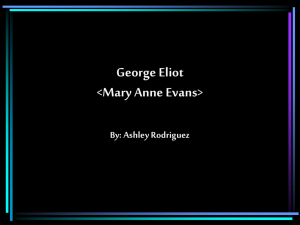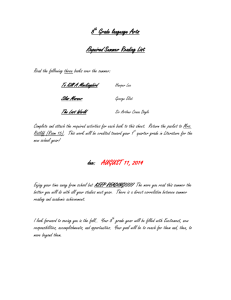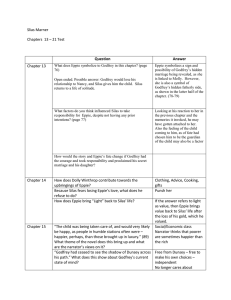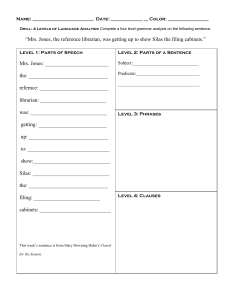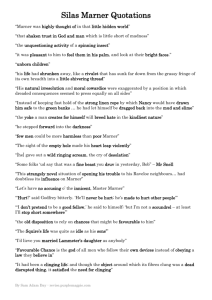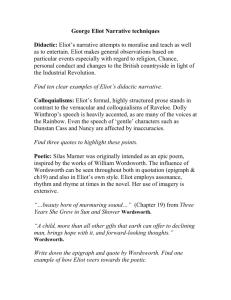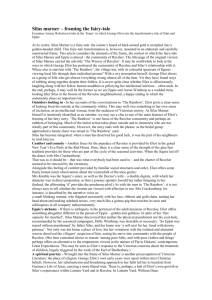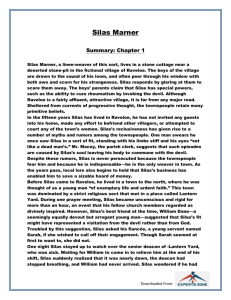Themes
advertisement
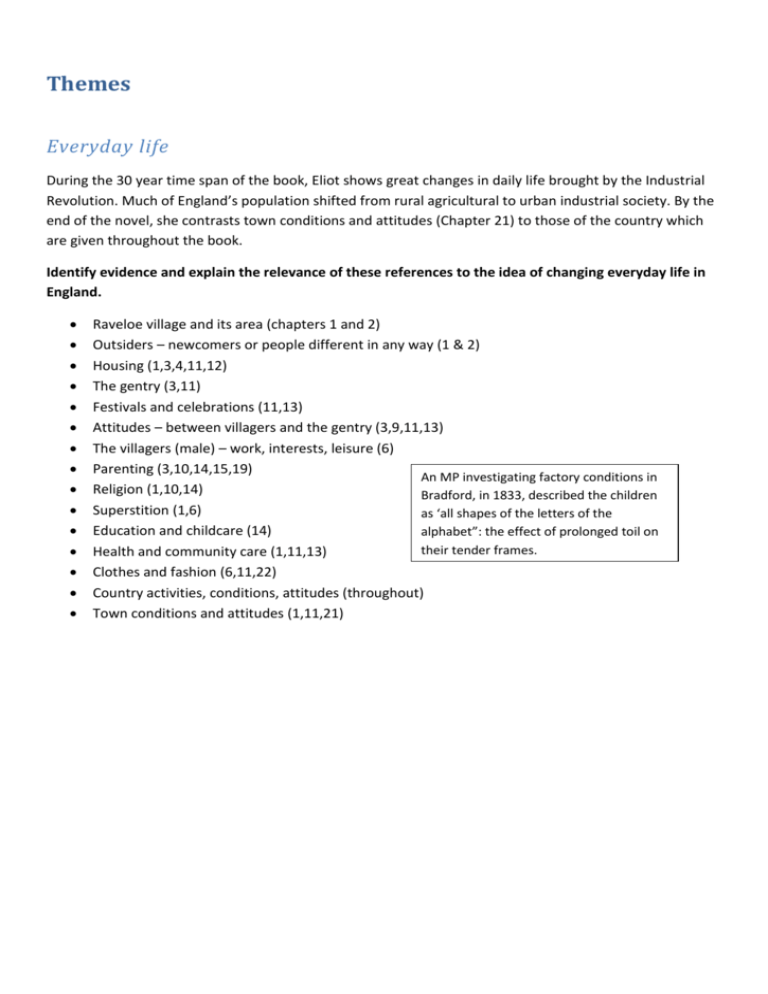
Themes Everyday life During the 30 year time span of the book, Eliot shows great changes in daily life brought by the Industrial Revolution. Much of England’s population shifted from rural agricultural to urban industrial society. By the end of the novel, she contrasts town conditions and attitudes (Chapter 21) to those of the country which are given throughout the book. Identify evidence and explain the relevance of these references to the idea of changing everyday life in England. Raveloe village and its area (chapters 1 and 2) Outsiders – newcomers or people different in any way (1 & 2) Housing (1,3,4,11,12) The gentry (3,11) Festivals and celebrations (11,13) Attitudes – between villagers and the gentry (3,9,11,13) The villagers (male) – work, interests, leisure (6) Parenting (3,10,14,15,19) An MP investigating factory conditions in Religion (1,10,14) Bradford, in 1833, described the children Superstition (1,6) as ‘all shapes of the letters of the Education and childcare (14) alphabet”: the effect of prolonged toil on their tender frames. Health and community care (1,11,13) Clothes and fashion (6,11,22) Country activities, conditions, attitudes (throughout) Town conditions and attitudes (1,11,21) Themes Religion Young people brought up by a deeply religious person or in a strongly religious environment, like the young Silas Marner and the young George Eliot, may not challenge their beliefs. The life and work of John Wesley (1703-91) had great appeal to poorly educated working people, especially those in towns. Small sects like the chapel congregation of Lantern Yard grew up in imitation of his followers who became known as Methodists because of their hardworking simple lives and orderly worship based on the bible. They were also called evangelicals (after the New Testament writers) and nonconformists because they did not accept the established Church of England. They also rejected its organisational structure, believing that all Christians are equal and replacing priests by ministers. In contrast, the established church continued in its traditional way, especially in country areas. When thinking about the importance of religion in the novel, consider the following and find information on: 1. The chapel in Lantern Yard (1,2,10, 14,21) 2. The church in Raveloe (2, 6, 10, 14, 16, 22) For both of the above, discuss / think about: - The beliefs held Its organisation; how it was run Its membership Attitudes to it Attitudes in encouraged Charles Darwin’s The Origin of Species was published in 1859. It questioned the literal accuracy of the first chapters of Genesis. Consider the practical effects on people’s lives from both chapel and church: - On their beliefs On their attitudes to others On their actions On their lives Perhaps Eliot intended the reader to reach conclusions about how religion affected people both in the town and in the country. Themes Duty Duty was very important to the Victorian readers for whom Eliot wrote. Those characters in the book who fail in their duty must be punished and those who do their duty must be rewarded. It is closely connected to a sense of justice and moral awareness. It involves our responsibilities to others and can come from our circumstances, from our beliefs, or both. In Silas Marner duty is presented through parenting and community. We have many examples of parents – natural and adoptive – if they do their duty their children turn out well; if neglected they turn out badly (except Eppie whom Silas adopts). Consider the parenting by the following, and the resulting children: Parents Child Squire Cass (p24 and 68) – punished Godfrey (p 24) – weak, selfish Dunstan (p 24) – vicious, evil Godfrey (p 172) punished Eppie 9p 118) – consider the result if she had gone, as would have been expected, to the workhouse Dolly and Ben Winthrop (p 48) Aaron ( p 181) – model son Mr Lammeter ( p 25, 98) – rewarded Priscilla p 152 – cares for her aged father Silas (p 118, 129) - rewarded Eppie – pp 173, 183 – model daughter In the same way the characters receive justice – the good (Silas) are rewarded and the evil (Dunstan and Godfrey) are punished. Themes Community There was no protection in Victorian England for house who lost their jobs – they went to the workhouse. A sense of community is an important theme in the novel. It links very closely with themes on people and environment, outsiders and ‘no man is an island’: all human actions, open or secret, bring results. Because the community at Lantern Yard wrongly accuse Silas of theft and expel him (chp 1), Silas comes to Raveloe. He visits neither the church nor the pub where the community meet, and he refuses through his unfriendly behaviour (chp 2, p. 19) to become part of the village. In turn, the villagers primitive sense of community makes them suspect and fear newcomers like Silas (chp 2, p 19) especially when he is so different from them in so many ways. A second theft (chp 4) the loss of his gold, makes Silas seek the help of the community (ch 5) and the villagers support him (chp 7). By adopting Eppie (chp 13) Silas saves the community her cost to the poor rate. This pleases and interests the community (ch 14). Eppie leads Silas into church and community (ch 14) – he is accepted and approved long before his adopted daughter marries into the community (Conclusion). Find and comment on the evidence as indicated above. In Victorian England, old or infirm people would be sent to the workhouse – unless helped by their children. Themes The consequences of a child’s presence This is another major theme and connects with parenting, duty and community. A child has a ripple effect on the lives of the surrounding people. This is recognised by Priscilla and Mr Lammeter (conclusion) as they watch the returning wedding group. Looking at Eppie, they both feel their age and miss the interest in life and the hopes brought by children and young people. At the beginning of the novel Silas seems older than his actual age of around forty years (chp 2). His lonely, miserly life brings him no happiness (ch 2). He works ‘like the spider’ (ch 2) without ‘love and fellowship’ (ch2). Like all weavers, his figure ‘shrank and bent’ (ch2) through the weaving and the weight of his ‘heavy bag’ (ch 1). As a result of Eppie’s arrival, he is able to carry a much heavier load – Eppie and ‘his yarn or linen at the same time’ (ch14) and he goes ‘strolling out’ (ch 14) with all the time in the world to enjoy nature and the countryside.
